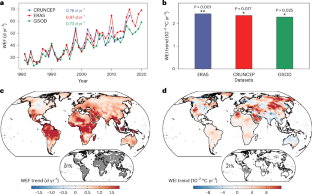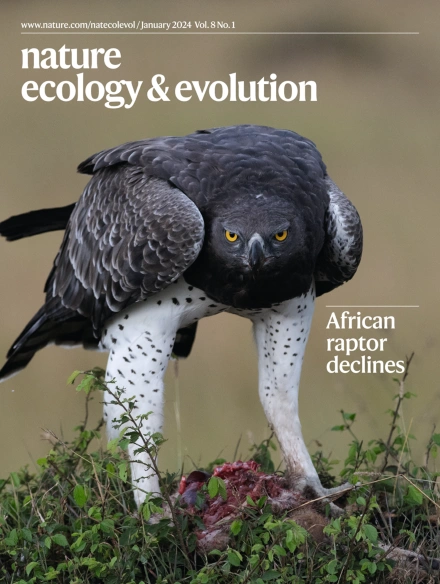极端气候变暖导致全球陆地固碳能力减弱
IF 13.9
1区 生物学
Q1 ECOLOGY
引用次数: 0
摘要
决定陆地固碳能力的生态系统净交换量(NEE)受到气候变化的强烈控制,并呈现出逐年大幅波动的趋势。极端暖流频率和强度的增加如何影响净生态系统交换量的变化,目前仍不清楚。在这里,我们结合了来自大气二氧化碳反演、地球系统模型、涡度-协方差数据驱动方法和气候数据集的多个 NEE 数据集,结果表明,在过去 40 年的暖极端事件中,陆地固碳能力被削弱,这主要是由热带地区造成的(81% ± 48%)。其根本原因在于,与陆地生态系统呼吸作用相比,总初级生产力呈压倒性下降趋势。此外,陆地固碳能力减弱的主要原因是从温度或土壤湿度控制过渡到蒸汽压力不足控制,而这与极端暖流强度的增加有关。我们的研究结果表明,极端暖流威胁着陆地生态系统的全球固碳功能。因此,在未来气候预测中,应更多地关注暖极端现象强度增加的演变。本文章由计算机程序翻译,如有差异,请以英文原文为准。


Weakening of global terrestrial carbon sequestration capacity under increasing intensity of warm extremes
The net ecosystem exchange (NEE), determining terrestrial carbon sequestration capacity, is strongly controlled by climate change and has exhibited substantial year-to-year fluctuations. How the increased frequency and intensity of warm extremes affect NEE variations remains unclear. Here, we combined multiple NEE datasets from atmospheric CO2 inversions, Earth system models, eddy-covariance data-driven methods and climate datasets to show that the terrestrial carbon sequestration capacity is weakened during warm extreme occurrences over the past 40 years, primarily contributed by tropical regions (81% ± 48%). The underlying mechanism can be rooted in the overwhelmingly decreased trend of gross primary productivity compared with terrestrial ecosystem respiration. Additionally, the weakened terrestrial carbon sequestration capacity is mainly driven by the transition from temperature or soil moisture control to vapour pressure deficit control, which is associated with the increasing intensity of warm extremes. Our findings suggest that warm extremes threaten the global carbon sequestration function of terrestrial ecosystems. Therefore, more attention should be given to the evolution of the increasing intensity of warm extremes in future climate projections. Extreme weather events are becoming more frequent and may have disproportionate effects on carbon cycling. Here, the authors quantify the impact of warm extreme occurrences on terrestrial carbon sequestration capacity over the past 40 years.
求助全文
通过发布文献求助,成功后即可免费获取论文全文。
去求助
来源期刊

Nature ecology & evolution
Agricultural and Biological Sciences-Ecology, Evolution, Behavior and Systematics
CiteScore
22.20
自引率
2.40%
发文量
282
期刊介绍:
Nature Ecology & Evolution is interested in the full spectrum of ecological and evolutionary biology, encompassing approaches at the molecular, organismal, population, community and ecosystem levels, as well as relevant parts of the social sciences. Nature Ecology & Evolution provides a place where all researchers and policymakers interested in all aspects of life's diversity can come together to learn about the most accomplished and significant advances in the field and to discuss topical issues. An online-only monthly journal, our broad scope ensures that the research published reaches the widest possible audience of scientists.
 求助内容:
求助内容: 应助结果提醒方式:
应助结果提醒方式:


